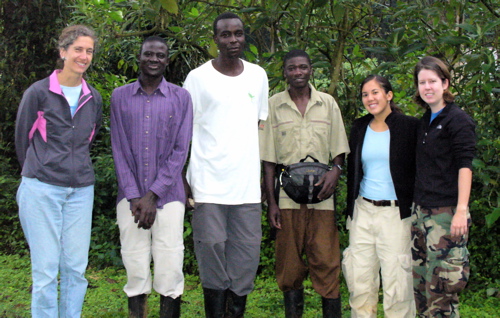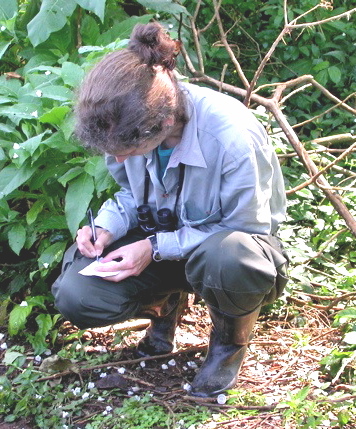SOCIAL COOPERATION
Cooperative
behavior, involving
joint action for mutual gain, has long interested evolutionary
biologists who try to explain its occurrence in terms of costs and
benefits to individuals. My major research focus currently is a
multi-year project investigating patterns of cooperative behavior in
wild monkeys, focusing on communal territory defense (a public good),
pairwise grooming (a private exchange) and feeding tolerance. Kin
selection theory provides a well-developed paradigm for studying kin
bias in cooperative behavior, but the degree to which real animals bias
beneficent behavior toward kin, especially non-offspring kin, is only
partially understood. The availability of kin, their degree of
relatedness, and their quality as cooperative partners may influence
kin bias. We evaluate kin bias directly, through both maternal and
paternal lines. Reciprocal interchange of different kinds of behavior
may also drive cooperation, both for kin and non-kin. We evaluate the
trading of cooperation in pairwise interactions (grooming, feeding
tolerance) as ways of maintaining contributions to a public good
(territory defense), where ‘free-riding’ is a potential problem. The
research is novel in (i) examining individuals’ strategies that link
between-group conflict and within-group cooperation in both kin and
non-kin, (ii) examining behavioral reciprocity, kinship and partner
quality simultaneously, (iii) investigating both maternal and paternal
kinship, and (iv) taking a biological markets perspective. It will
contribute to our understanding of the role of nepotism in the
cooperation of wild, long-lived animals, and how kinship interacts with
reciprocity in guiding social exchange. Furthermore we will investigate
reputation, which in recent theory has linked dyadic cooperation with
the maintenance of public goods.
 To evalute a number
of particular hypotheses, we will combine behavioral observations of a
well-habituated, long-studied wild population of blue monkeys with
laboratory analysis of microsatellite loci from fecal DNA (to assess
kin relations). The hypotheses we will test include: (1) Female blue
monkeys engage in cooperative behavior to enhance gains in inclusive
fitness: thus, cooperation is more likely when partners are more
closely related.; (2) Individuals are more likely to participate in
cooperative acts if they benefit more from doing so; (3) Individuals
who bear higher costs are less likely to participate in cooperative
acts; (4) Grooming and (5) Feeding tolerance are used as an incentive
to encourage participation in territorial defense; and (6) Females who
are generally cooperative in the contexts of territorial defense and
grooming are the ones most likely to receive cooperation when they
request it. Maternal kin relations are largely known from pedigrees.
Sampling protocols for fecal DNA are well-established, we have most of
the needed samples in hand at this point. We have developed a panel of
markers, and genotyping of our study population is underway.
To evalute a number
of particular hypotheses, we will combine behavioral observations of a
well-habituated, long-studied wild population of blue monkeys with
laboratory analysis of microsatellite loci from fecal DNA (to assess
kin relations). The hypotheses we will test include: (1) Female blue
monkeys engage in cooperative behavior to enhance gains in inclusive
fitness: thus, cooperation is more likely when partners are more
closely related.; (2) Individuals are more likely to participate in
cooperative acts if they benefit more from doing so; (3) Individuals
who bear higher costs are less likely to participate in cooperative
acts; (4) Grooming and (5) Feeding tolerance are used as an incentive
to encourage participation in territorial defense; and (6) Females who
are generally cooperative in the contexts of territorial defense and
grooming are the ones most likely to receive cooperation when they
request it. Maternal kin relations are largely known from pedigrees.
Sampling protocols for fecal DNA are well-established, we have most of
the needed samples in hand at this point. We have developed a panel of
markers, and genotyping of our study population is underway. 
The genetics (lab) part of this
project is being carried out in the lab
of my NYCEP colleague Todd Disotell at New York University in
collaboration with my post-doc Eleni Nikitopoulos.
The photo
above shows our 2007 field research team: Charles Oduor, Erinest
Shikanga, Eric Widava, Sujen Roberts, and Anna Fulghum (missing: Millie
Atamba). In 2008, we added Corey Mitchell and Alicia Rich. To the
right, fecal collection.
This material is based upon work supported by the National
Science Foundation under Grant No. 0554747. Additional support
was provided by the Wenner Gren Foundation and the Louis Leakey
Foundation.
 To evalute a number
of particular hypotheses, we will combine behavioral observations of a
well-habituated, long-studied wild population of blue monkeys with
laboratory analysis of microsatellite loci from fecal DNA (to assess
kin relations). The hypotheses we will test include: (1) Female blue
monkeys engage in cooperative behavior to enhance gains in inclusive
fitness: thus, cooperation is more likely when partners are more
closely related.; (2) Individuals are more likely to participate in
cooperative acts if they benefit more from doing so; (3) Individuals
who bear higher costs are less likely to participate in cooperative
acts; (4) Grooming and (5) Feeding tolerance are used as an incentive
to encourage participation in territorial defense; and (6) Females who
are generally cooperative in the contexts of territorial defense and
grooming are the ones most likely to receive cooperation when they
request it. Maternal kin relations are largely known from pedigrees.
Sampling protocols for fecal DNA are well-established, we have most of
the needed samples in hand at this point. We have developed a panel of
markers, and genotyping of our study population is underway.
To evalute a number
of particular hypotheses, we will combine behavioral observations of a
well-habituated, long-studied wild population of blue monkeys with
laboratory analysis of microsatellite loci from fecal DNA (to assess
kin relations). The hypotheses we will test include: (1) Female blue
monkeys engage in cooperative behavior to enhance gains in inclusive
fitness: thus, cooperation is more likely when partners are more
closely related.; (2) Individuals are more likely to participate in
cooperative acts if they benefit more from doing so; (3) Individuals
who bear higher costs are less likely to participate in cooperative
acts; (4) Grooming and (5) Feeding tolerance are used as an incentive
to encourage participation in territorial defense; and (6) Females who
are generally cooperative in the contexts of territorial defense and
grooming are the ones most likely to receive cooperation when they
request it. Maternal kin relations are largely known from pedigrees.
Sampling protocols for fecal DNA are well-established, we have most of
the needed samples in hand at this point. We have developed a panel of
markers, and genotyping of our study population is underway. 